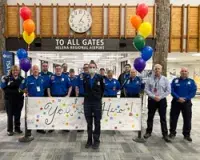
TSA Officer Brandi Jenkins is a frequent donator at local blood drives. Since high school, she has taken the time to give back to the community in this way.
The needles and blood don’t bother her. Jenkins considers the service a minor hassle that makes a huge impact. When Jenkins came across the website, Be The Match, she didn’t hesitate to register.
“I didn't really know anything about the program,” Jenkins said. “I looked into it and read about it and thought, ‘Well, this is easy.’ You know, it’s so easy to do, just sign up and possibly help and donate to somebody who really needs it. Everybody needs blood, but there's only so many people who can donate bone marrow and blood stem cells to people with with cancer or other diseases. So I signed up.”
Be The Match uses DNA samples to connect patients with a donor match for life-saving marrow or blood stem cells. According to their website, there are more than 39 million donors registered around the world, and Jenkins is one of them.
She joined the donor pool a few years ago and was recently contacted as a match.
Jenkins passionately described the registration process. “All they do is send you a swab in the mail. You swab the inside of your mouth, send it back and that's it. You fill out a little bit of paperwork, and you just wait on the list until you get a match.”
After thinking a moment, she continued, “Well, if you get a match. It's kind of rare for people to get a match. There's some people who have donated three times; their DNA can match with a lot of people. Others, who have very rare DNA, they might not ever get a match. So, I was pretty excited to hear about matching, and I matched with an elderly lady who has cancer. I was just stoked. I went through a bunch of extra screening, blood tests, physicals. They took like 14 vials [of blood] from me for testing. I was a little woozy after that.”
As Jenkins prepped for the donation process, her coworkers at Helena Regional Airport (HLN) organized to fill shift gaps during her leave.
HLN Transportation Security Manager, Mike Ellis, talked about the enthusiasm that filled the small airport. “Everybody was on board with helping in her absence. We were just so excited to hear about what she was doing because she was saving a life – a life of a stranger,” Ellis said. “I have a magnificent crew. It’s nothing but a big family here. Even though we're just a category three airport, we have 21 officers. It’s a big family.”
Five days before Jenkins’ donation day, she received 10 shots – two a day – to boost her blood stem cell count. “That was the hardest part of the process,” she recounted.
On the day of the donation, she readied herself the donation process.
“They had me hooked up to this machine. And, for some people it can take up to 8 to 12 hours or go into a second day of donating. Mine only took five-and-a-half hours. And that was long,” Jenkins said, with a laugh.
“Luckily, I've got ginormous veins. They used my right arm and were taking everything out of it through this machine that spins the blood and separates all the different blood cells. And then they take only a select amount [of blood cells] from the very top of the machine, which is the blood stem cells. It was the largest needle I’ve ever had in my veins. My right arm was locked into place. I couldn’t move it.”
Jenkins’ mom joined her for the process, and together they passed the time by watching movies, chatting and attempting an unsuccessful nap. Her can-do, no-problem attitude saw the almost 6-hour donation as a minor inconvenience to save a stranger’s life.
Back at HNL, Jenkins returned to a surprise her coworkers planned in her absence. A crafty congratulatory banner hung in the stairwell, welcoming her back.
“They conned to me into going to the break room and then walking upstairs to the banner,” Jenkins said. “They did a good job at surprising me. It was very sweet.”
Ellis said, “I’m extremely proud of Brandi for what she did. She sacrificed her time, and potentially her health, to help a perfect stranger. She possibly saved that stranger’s life by her enormous generosity of giving. She helped this stranger without expecting anything in return. That is what true self-worth is all about. I am also extremely proud of all my officers for rallying around her and supporting her through this process, and the huge welcome they gave her when she returned to work. I would encourage everyone to sign up to Be The Match. You too could help save a life.”
When asked why she chose to donate, Jenkins replied, “It hits pretty close to home. A lot of my family has had cancer. I've had several family members died from cancer. So you know, I'm kind of expecting it for myself and dreading it for my other family members. But since it is a close subject to me, personally, I figure that if I can help somebody and ease their pain or their family's pain or something like that, I'll do whatever I can.”
By Kimberlyn Pepe, Strategic Communications & Public Affairs



